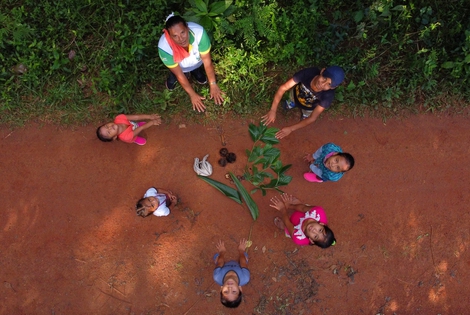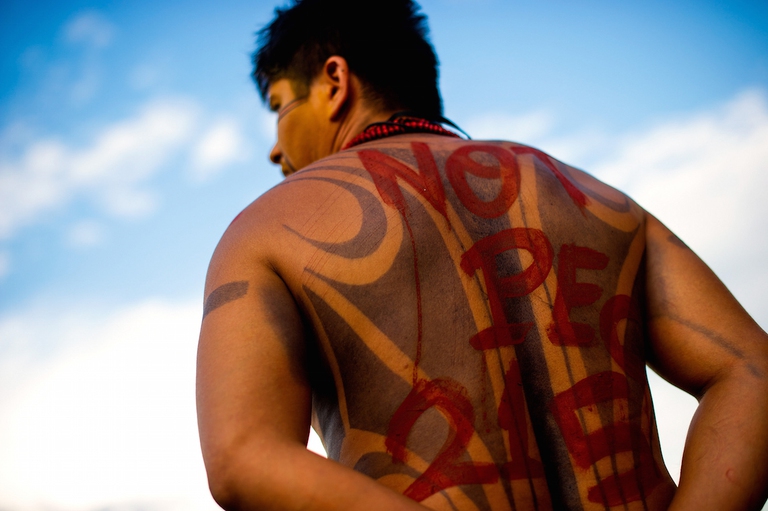
The Amazon became an alternative classroom during the pandemic. Now, the educational forest in Batraja, Bolivia, lives on to teach children and adults the value of nature.
Sandwiched between the 2014 World Cup and the 2016 Olympics, Brazil is hosting the first ever World Indigenous Games. From the 23rd of October to the 1st of November 2,000 athletes from 50 ethnic groups and 23 countries compete in events ranging from football and tug of war to indigenous disciplines such as xikunahity, a football-style game
Sandwiched between the 2014 World Cup and the 2016 Olympics, Brazil is hosting the first ever World Indigenous Games. From the 23rd of October to the 1st of November 2,000 athletes from 50 ethnic groups and 23 countries compete in events ranging from football and tug of war to indigenous disciplines such as xikunahity, a football-style game played on all fours. The Games are held in the city of Palmas, home to 10,000 indigenous people and the capital of Tocantins state in Brazil, which is populated by seven ethnicities.
The event’s performance is high on a number of counts.
Preserving indigenous traditions is a challenge all over the world. Showcasing native cultures through a sporting event celebrates their uniqueness and encourages mutual understanding.
24 indigenous groups from Brazil and dozens of others from countries as far flung as Australia, Ethiopia and Mongolia meet to share their customs and knowledge. Lamarr Oksasikewiyin of the Nehiyaw people of Canada is a Games participant. He says the event has shown him how indigenous people all over the world are united by the same concerns.
Only some of the disciplines are played competitively, such as archery, canoeing and corrida de tora (bullfighting). The rest are demonstration events where no one wins. Every athlete gets a medal because the Games aren’t about being “champion of the Indians” but about “spiritual celebration” explains Marcos Terena of the Xané people of Brazil, President of the NGO Inter-Tribal Committee. He came up with the idea of the event based on a national version of the indigenous games held since 1999.
Compared to the lavish expenditure of the World Cup, put at 15 billion dollars, the Palmas games are a drop in the ocean. The cost is 40 million dollars and attendance is free. Unlike major sporting events these aren’t focused on churning out money and advertising deals.
Yet the World Indigenous Games have also been accused of committing a grave foul: that of hypocrisy.
It is estimated that in pre-colonial times Brazil was home to anywhere between three to eleven million native inhabitants. The Portuguese first arrived in 1500 and within a century 90 per cent of the original population had been wiped out. Now, Brazil’s 900,000 indigenous citizens are half of a hundredth of its 200 million people. Though the land they hold covers a tenth of the vast country they are its poorest inhabitants, given also that they don’t own natural resources such as forests and minerals.
The interests of Brazil’s huge agribusiness sector as well as those of the timber, mining and energy ones are represented by the “ruralista” bloc, which holds 250 of the 594 seats in Brazil’s Congress. In contrast, only a single indigenous person has ever sat in Congress. In 2014 President Dilma Rousseff chose a leading ruralista, Tocantins Senator Kátia Abreu as Minister of Agriculture, known as the chainsaw queen for supporting projects leading to Amazon deforestation.
The Senate, one of Congress’ two branches, has approved Proposed Constitutional Amendment 215 (PEC 215), which must now be voted on by the Lower House, the second congressional body. PEC 215 would give Congress, thus its ruralista elements, the power that currently resides with the Minister of Justice to demarcate the boundaries of indigenous territories. This threatens almost 80,000 square kilometres of land with agricultural exploitation.
Brazilian President Dilma Rousseff attended the opening ceremony of the World Indigenous Games to the sound of boos and hisses. The message was clear: indigenous people do not consider the Brazilian government their friend. Other protests have interrupted the event with participants holding up banners against PEC 215 and calling for the “end of indigenous genocide”.
Life isn’t easy for indigenous Brazilians. The forests, rivers and savannas that are their homes are threatened by plantations, animal grazing, hydroelectricity and mining, just to mention a few. Their culture risks assimilation into mainstream society and they are poorly represented in politics. What is more, Brazil is an outright dangerous country for them. Yet the World Indigenous Games are an occasion to suspend disbelief and let the joy of sport and uniqueness of indigenous traditions take centre stage. To relish in the colours, shapes and sounds, the inexhaustible vitality.
Siamo anche su WhatsApp. Segui il canale ufficiale LifeGate per restare aggiornata, aggiornato sulle ultime notizie e sulle nostre attività.
![]()
Quest'opera è distribuita con Licenza Creative Commons Attribuzione - Non commerciale - Non opere derivate 4.0 Internazionale.
The Amazon became an alternative classroom during the pandemic. Now, the educational forest in Batraja, Bolivia, lives on to teach children and adults the value of nature.
A special report from the Yuqui territory delves deep into the dreams, challenges, joys and sadness of one of Bolivia’s most vulnerable indigenous groups.
The Yuqui people of the Bolivian Amazon fight not only to survive in the face of settlers, logging and Covid-19, but to preserve their culture and identity.
Jair Bolsonaro is accused of crimes against humanity for persecuting indigenous Brazilians and destroying the Amazon. We speak to William Bourdon and Charly Salkazanov, the lawyers bringing the case before the ICC.
Our species took its first steps in a world covered in trees. Today, forests offer us sustenance, shelter, and clean the air that we breathe.
Activists hail the decision not to hold the 2023 World Anthropology Congress at a controversial Indian school for tribal children as originally planned.
Autumn Peltier is a water defender who began her fight for indigenous Canadians’ right to clean drinking water when she was only eight years old.
The pandemic threatens some of the world’s most endangered indigenous peoples, such as the Great Andamanese of the Andaman and Nicobar Islands in India.
100,000 mink will be culled in Spain after testing positive for coronavirus. Meanwhile, the Netherlands abandons mink farming completely.









